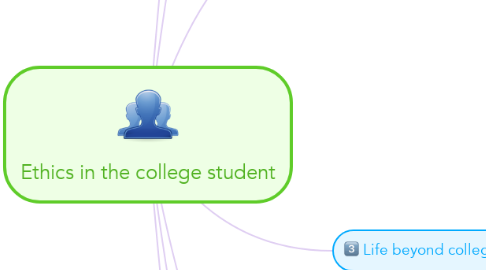
1. Chee, K. H., Pino, N. W., & Smith, W. L. (2014). Sociological Viewpoints. Assessing the Factors Associated with the Possession of an Academic Ethic in College., 30(1), 50-70.
2. Student apply those ethics to academics
2.1. Social influences
2.1.1. “The professional army ethic is a shared set of values, the guiding beliefs, standards and ideals that characterized and motivated the army.”(Professional Army Ethics) chapter 1
2.2. At what measure are you willing to go to be accepted? Will you cave in or ignore the pressure?
2.2.1. ”Students with an academic ethic also attend classes on a regular basis and resist partying and excessive drinking” (Assessing Factors pg51). Would you swim in a kiddie pool filled with vomit, urine, fecal matter, semen and rotten food products? Would you run a gauntlet where your fellow band members were punching you or striking you with drumsticks and musical instruments? As you read this today, I assume your response is, "Are you crazy?" (How Far)
2.2.2. Sometime in your college career, you will see something that isn't right. Hopefully, it won't be as awful as child molestation, but you may well witness cheating or racist behavior or drunk driving. Will you have the courage to speak up? (How Far)
2.3. How society looks at someone? And how they achieved it?
2.3.1. University student Dharun Ravi showed us what can happen when roommates don't get along. Ravi used a webcam to record his roommate Tyler Clementi making out with a male date and then broadcast the footage to other students. Clementi killed himself. Ravi went to jail. You don't have to love the people you live with, but there are boundaries to how you treat another person. (How Far).
3. Life beyond college
3.1. Personal Life Experiences
3.2. Whether college was good or bad, will you transfer those ethics into your next year or career?
3.2.1. Research found that students who are academically and socially engaged experience a smoother transition to college and are more likely to return for their sophomore year. (Assessing Factors pg52).
3.3. What type of student does one have to be to land a job or further their education?
3.3.1. Many people do view a college education as an entry ticket to a profession, and they may therefore choose to major in some practical field like engineering or business (How Far)
3.3.2. Army regulation 600-50 “ chapter 1-1, prescribes standards of conduct required of all department of the army personal, regardless of assignments, to avoid conflicts and the appearance of conflicts between private interest and official duties.” Chapter 1-4b “government service or employment, as a public trust, requires soldiers and army civilians to act with integrity and abide by the values of the PROFESSIONAL ARMY ETHIC” .This ethic prescribes that all employees and soldiers in the army live and work using loyalty, duty, selfless service and integrity.”
4. Conclusion
4.1. Restated Thesis
4.2. Students Ethics
4.2.1. Loyalty, duty, respect, selfless service, honor, integrity, personal courage
4.3. Ethics in Academics
4.4. Ethics in life after College
5. Student’s ethics
5.1. Family upbringing
5.2. What childhood lessons learned help instill ethics?
5.2.1. “The academic ethic has to be learned and can be acquired early in their educational experience” (Assessing Factors pg50). Students possess an academic ethic in high school, found that the amount of time spent on homework after school during one’s high school years had a positive and significant impact on educational attainment. (Assessing Factors pg 52). Students who found college preparation assistance more helpful are more likely to possess an academic ethic in college (Assessing Factors pg57).
5.3. What factors a students conduct either good or bad?
5.3.1. Laws have been set in place in our nation to influence peoples behaviors. Influences help people understand right and wrong according to their culture. For instance, sharing toys with other kids instead of outright taking them without permission could be a learned right behavior. Another lesson could be whether to do your own homework, and if you didn’t, have the courage to tell the truth when asked by the teacher. Over time students' learned behaviors and other factors made it acceptable to just cheat because it is the easy way out.
5.4. How ones family influences a child's ethics?
5.4.1. To most people family holds a lot of weight on how they decide whether to do the right thing or not. One might be scared to fail or tell their parents their short comings. With that amount of pressure and weight on a child or student one might veer off the right path. A student might try stealing, cheating or plagiarism to achieve a certain grade in class.
6. Definition of Ethics
6.1. Ethics: an area of study that deals with ideas about what is good and bad behavior : a branch of philosophy dealing with what is morally right or wrong (Merriam-Webster)
6.2. Values and Mores
6.2.1. The customs, values, and behaviors that are accepted by a particular group, culture(Merriam-Webster)
6.3. Personal Values and Moral values in general.
6.3.1. Throughout time mankind has wondered what ethics is. Needless to say what is right and wrong, and who’s right. There are many ways to defined ethics to help individuals understand the meaning of ethics can come down to what the person’s personal values and morals are to themselves. Personal values and morals is what is instilled in to everyone at an early age. What one person holds near and dear to their heart with the utmost respect could be defined as personal values.
